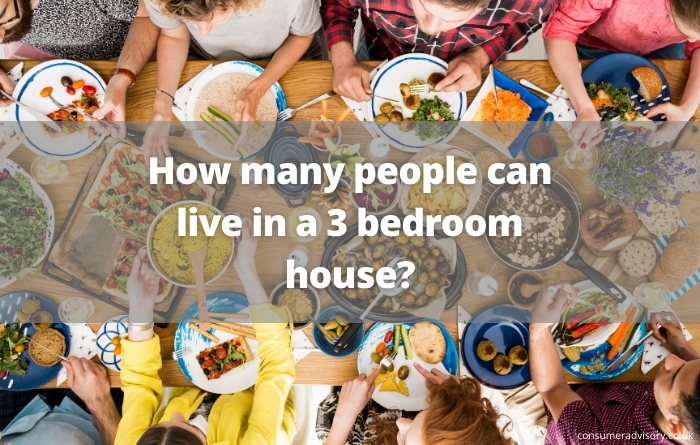How many people can live in a 3 bedroom house? The answer to this question depends on a number of factors, including the size of the rooms and the age and gender of the occupants. If two people of the opposite sex have to sleep in the same room, the accommodation will be overcrowded unless they are married or a cohabiting couple or one person is a child under ten years old.
The number of people of the same sex (unless they are a same-sex couple) who can sleep in one room is also restricted by the size of the room. For example, if two people have to share a room that is less than 50 square feet, they will be considered to be overcrowded. In general, however, a three-bedroom house can comfortably accommodate six people.
Of course, the number of people who can live in a house also depends on the number of bathrooms and how well the occupants get along! If there are three bedrooms and two bathrooms, for example, eight people could theoretically live in the house if they were all close friends or family members. In reality, however, most people would find this level of overcrowding to be unacceptable.
So, in answer to the question, how many people can live in a three-bedroom house? The answer is six, but it really depends on the individual circumstances.
The guidelines for counting rooms in a house are important to consider when trying to determine the value of the property. The main rooms that are counted include living rooms, bedrooms and large kitchens. For the space and floor area calculations, children under one-year-old are ignored children between one and ten years old count as a half, and rooms under 50 square feet are ignored. All of these factors help to provide a more accurate representation of the size of the house, which is important in determining its value.
Generally speaking:
- 1 room = 2 people
- 2 rooms = 3 people
- 3 rooms = 5 people
- 4 rooms = 7.5 people
- 5 or more rooms = 2 people per room.
The floor area of a room also determines how many people can sleep in it:
- floor area 110 sq feet (10.2 sq metres approx) = 2 people
- floor area 90 – 109 sq ft (8.4 – 10.2 sq m approx) = 1.5 people
- floor area 70 – 89 sq ft (6.5 – 8.4 sq m approx) = 1 person
- floor area 50 – 69 sq ft (4.6 – 6.5 sq m approx) = 0.5 people.
What is the law on overcrowding?

Section 325 of the Housing Act 1985 provides that there must be an adequate number of bedrooms in order for everyone living at the same address to have their own room. If you find yourself with ten or more people inside your house and they’re all under twenty-one years old, then it’s considered overcrowded according to this law passed by Parliament.
If your home is overcrowded
If your home is overcrowded, you may be classified as homeless by law. This means you would have priority if you applied for council housing.
Additionally, your home could be at risk of being condemned if it is found to be uninhabitable. If you have children, they may have to be placed in foster care if there is not enough room for them in your home.
If you are elderly or have a disability, overcrowding can also make it difficult to receive the care and assistance you need. As a result, it is important to take action if your home is becoming overcrowded. You may need to move to a larger home or contact your local authority for help.
How many bedrooms am I entitled to in a council house UK?
According to the Housing Act of 1988, everyone is entitled to a “decent” home. This means that, as a general rule, you should have one bedroom for each person who’s single and aged 16 or older. Two people usually need to share a room if they’re a couple or if they’re under 10 years old – it doesn’t matter if they’re girls or boys.
However, there are some exceptions to this rule. For example, if you have a disabled child, you may be entitled to an extra bedroom to accommodate their needs. Additionally, if you live in a particularly small property, you may be exempt from the one-bedroom-per-person rule. Ultimately, it’s up to your local authority to decide whether or not your home is overcrowded.
What are the consequences of overcrowding?

Overcrowding can have a number of negative consequences, both for your health and for your quality of life. For example, it can lead to mental health problems, as well as a feeling of isolation and social exclusion.
Additionally, it can cause financial problems, as you may have to spend more money on essentials like food and heating. Additionally, overcrowding can lead to problems with hygiene, as there may not be enough space for everyone to have their own bed or bathroom. Ultimately, it’s important to address the issue of overcrowding as soon as possible, before it starts to impact your health and wellbeing.

